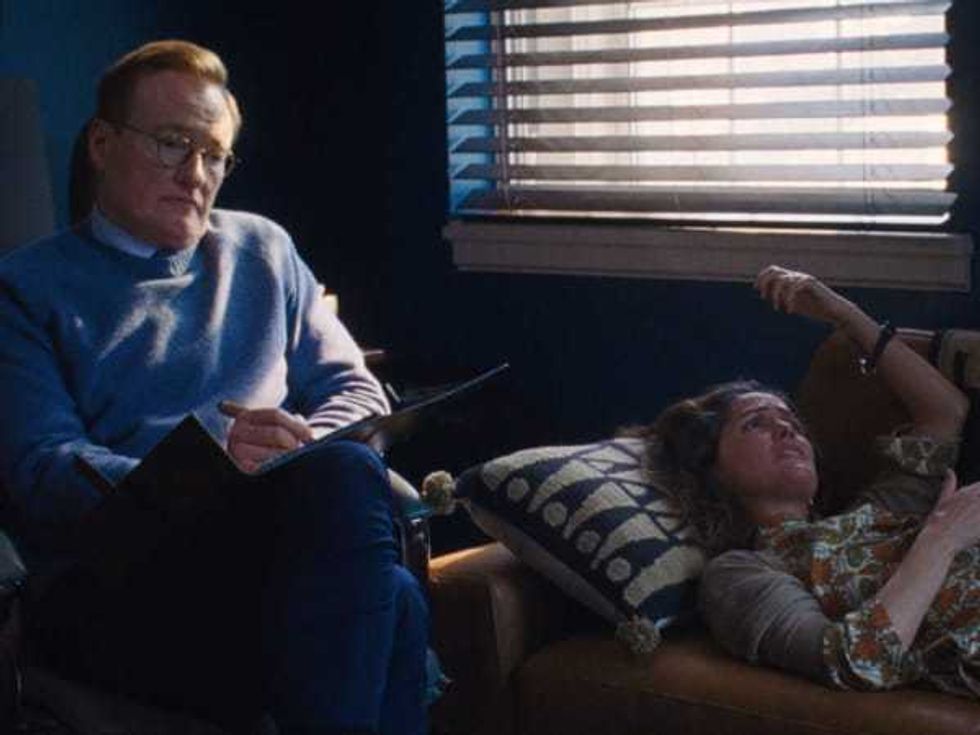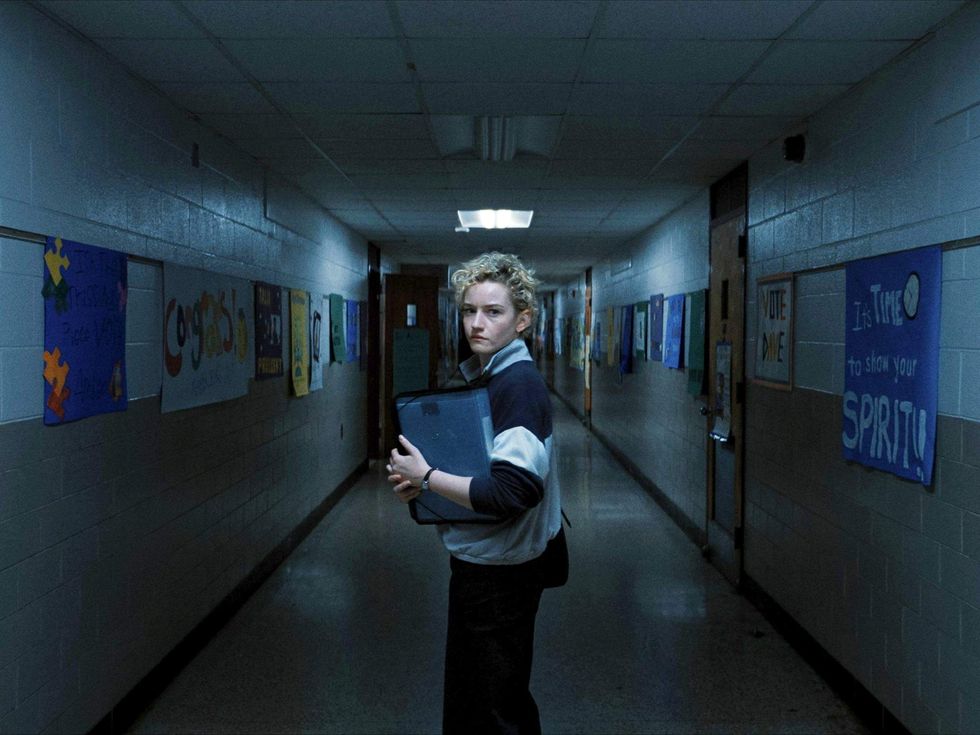Domestic drama in the park
The "real housewives" of Houston Shakespeare Festival mix it up in Hamlet &Comedy of Errors
 The Houston Shakespeare Festival kicks off Friday night with Hamlet.HoustonFestivalCompany.com
The Houston Shakespeare Festival kicks off Friday night with Hamlet.HoustonFestivalCompany.com David Rainey and Benjamin Reed in HamletPhoto by Chase Pedigo/University of Houston
David Rainey and Benjamin Reed in HamletPhoto by Chase Pedigo/University of Houston
What’s better than a little theater in the park? Domestic drama in the park, and no one was better at stirring up a little trouble at home than William Shakespeare.
Why drive to Winedale? Summer time is Shakespeare time in Bayou City as the Houston Shakespeare Festival returns for its 37th season with performances of an unusual pairing of Shakespeare’s Hamlet, that marquee political tragedy once called “the Mona Lisa of literature” by T.S. Eliot, and the humorous if unsettling drama of twins and shipwrecks, Comedy of Errors.
Hamlet, directed by Paul Steger, runs Friday, Sunday, Tuesday, and Aug. 9 while Comedy of Errors, directed by Steve Pickering, runs Saturday, Wednesday as well as Aug. 10 and 12. All performances begin at 8:30 p.m. at Miller Outdoor Theater in Hermann Park.
Of course, Shakespeare was never a writer satisfied with simple. Tragedy and comedy begin to blur right before your eyes.
At first Hamlet and Comedy of Errors might seem star-crossed lovers. Hamlet is a hyper-self-conscious revenge tragedy of intrigue, hesitation, melancholy, and madness. Comedy of Errors, is a quick, witty drama of postponed family reunions and marital strife made mirthful by the confusion of two pairs of identical twins.
Of course, Shakespeare was never a writer satisfied with simple. Tragedy and comedy begin to blur right before your eyes. Hamlet is brooding but also oddly funny, even if most of the laughter is guilty, gallows humor. This is, after all, a play in which the protagonist talks to a skull and jumps in a grave with a corpse.
Let’s be clear, like most tragedies, the stage is piled with bodies at the end. But Hamlet’s undercurrents of odd humor might help explain why this is the most parodied of Shakespeare’s works, and perhaps of all literature.
Here is, a spoof by the Simpsons. My favorite part? Lisa’s unsentimental and rather competitive Ophelia:
The Simpsons' Hamlet from Miss MacClean on Vimeo.
Comedy of Errors may have “comedy” in the title but the play begins with the threat of death. The hapless Egeon travels the Mediterranean to reassemble his family split apart years earlier by shipwreck. Having landed in the hostile city of Ephesus, which is in the midst of a merchant dispute with his home city Syracuse, he must pay a fine he can’t afford or be executed. The audience might enjoy the hilarity of mistaken identities when his twin sons, both named Antipholus, and their twin servants, both named Dromio, end up in the same city. But the central characters feel the terror of isolation as they imagine themselves losing their minds or falling victim to dark magic.
Comedy of Errors and Hamlet also share another commonality, which is they are both obsessed with the domestic sphere. Although Denmark’s political future constantly hangs in the balance, Hamlet can’t stop thinking about the erotic lives of his mother, father, and uncle. Similarly family centered, the challenge of Comedy of Errors is to reassemble a broken family. This is also a play bent on fixing marriage, which seems an institution as broken as the ship shattered by the storm that scattered Egeon’s family.
Comedy of Errors may have “comedy” in the title but the play begins with the threat of death.
What does family drama look like in Shakespeare? Often it seems it’s all about the boys in the history plays and tragedies while comedies are little more female-friendly. But Hamlet and Comedy of Errors offer fascinating drama for women, and if you make it to Hermann Park for one or both of these plays, pay attention to what happens to wives, sisters, and mothers.
Hamlet offers a pair of famously tortured women. Has anyone ever really been able to understand Hamlet’s mother, Gertrude, who married her husband’s brother, Claudius, a little too quickly for Hamlet’s taste. Not to mention the fact that Claudius killed his brother, Hamlet’s father. Did Gertrude know? Was she part of the plot?
Maybe Hamlet is so famously and unhealthily obsessed with his mother because he, like us, can’t really understand her.
Gertrude ends up accidentally murdered by her husband. Claudius uses a staple of revenge plays, poison, but Hamlet’s tainted wine ends up in Gertrude’s gullet. Once started, revenge threatens the very fabric of society, and no one is safe until the very end.
At least Gertrude, for most of the play, thinks she’s happy. Poor Ophelia, whose love for Hamlet drives her to madness, is little more than a pawn for most of the play, serving the needs of her scolding father Polonius, the desperate King Claudius, and her melancholic boyfriend. Some of the most potent lines in the play come from a rare moment between Gertrude and the dead Ophelia. Gertrude recalls the last moments of Ophelia’s life as she plunges herself in a brook. What Gertrude sees is utterly captivating and horrifying at the same time, a drowning angel:
Her clothes spread wide,
And mermaidlike awhile they bore her up,
Which time she chanted snatches of old lauds,
As one incapable of her own distress,
Or like a creature native and indued
Unto that element."
Hamlet seems to offer women few roles: dead or mad or both or sequestered from society in a nunnery. But at least Gertrude and Ophelia are practically household names. What of poor Adriana and Luciana in Comedy of Errors? While the twins confuse everyone around town, including themselves, the women carry on a significant conversation about the nature of marriage.
Adriana, who is married, advocates liberty for wives, while her unmarried sister Luciana advocates a wife’s obedience to her husband. Perhaps not surprisingly, some of the most potent lines of the play are given to Adriana on the subject of marital discord. Here she is confronting a confused Antipholus:
How comes it now, my husband, O, how comes it,
That thou art then estrangèd from thyself?
Thyself I call it, being strange to me,
That, undividable, incorporate,
Am better than thy dear self's better part.
Ah, do not tear away thyself from me!"
There’s much language to treasure in Comedy of Errors, but as you focus on the women, listen very closely for a special Shakespearean sound effect. You’ll hear, in several scenes, the women begin to rhyme when they talk to each another, which is rare even for Shakespeare.
If you go to Hermann Park you’ll hear the music Shakespeare’s women make in impossible circumstances. But there’s still fun to be had. Here’s the Great River Shakespeare Festival’s “real housewives” take on Shakespeare’s unforgettable queens:











